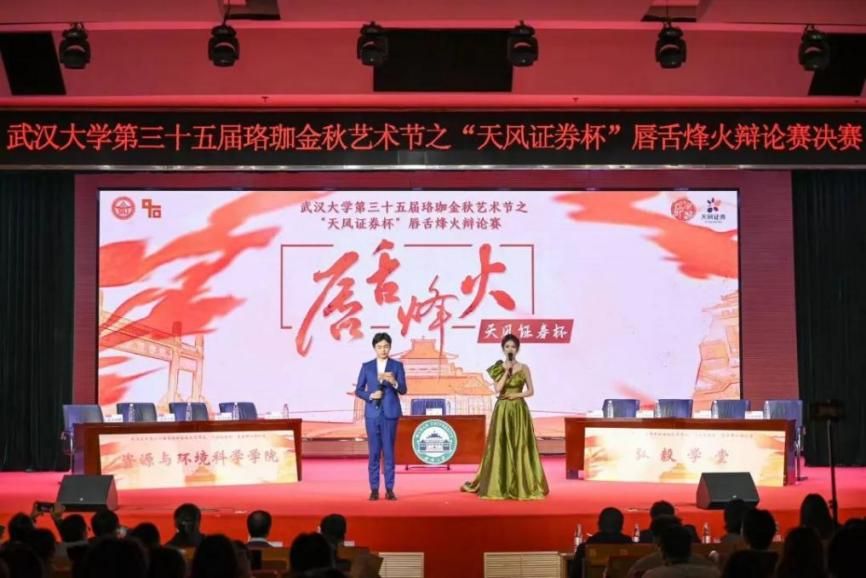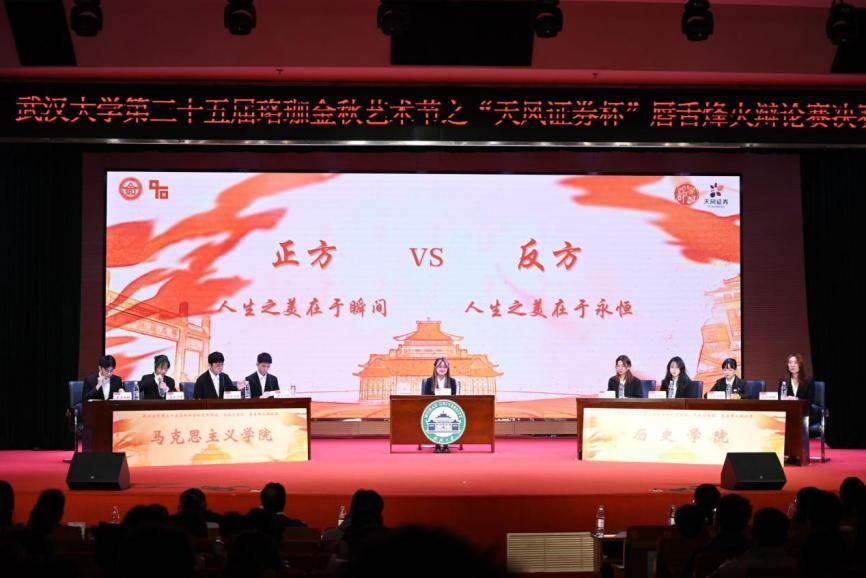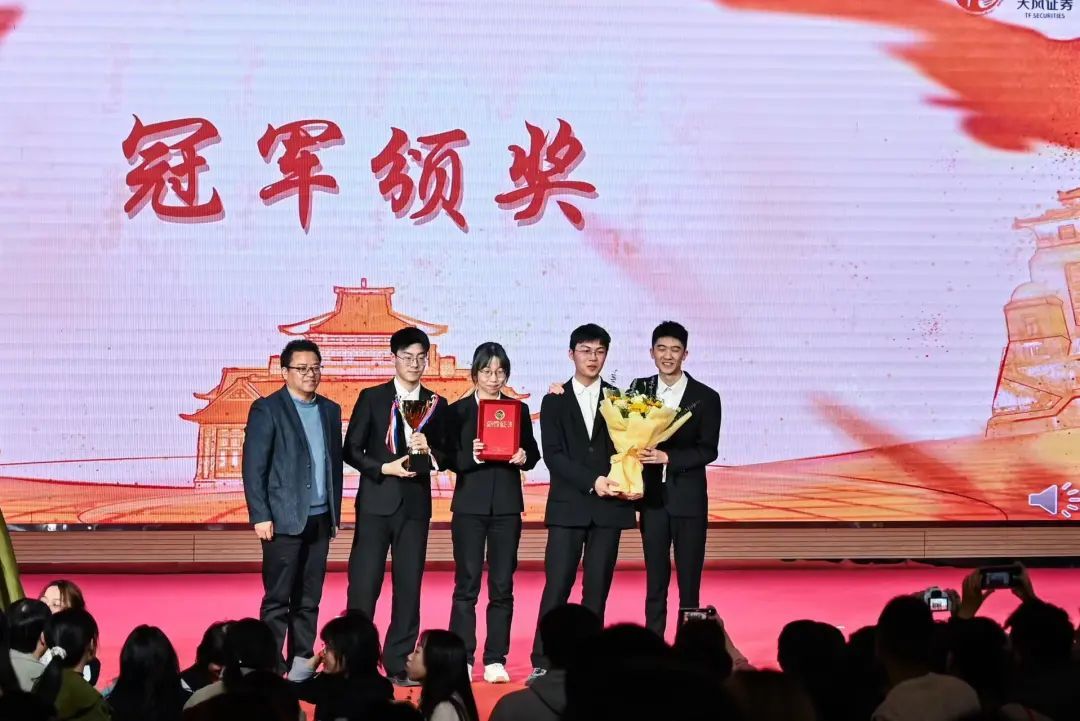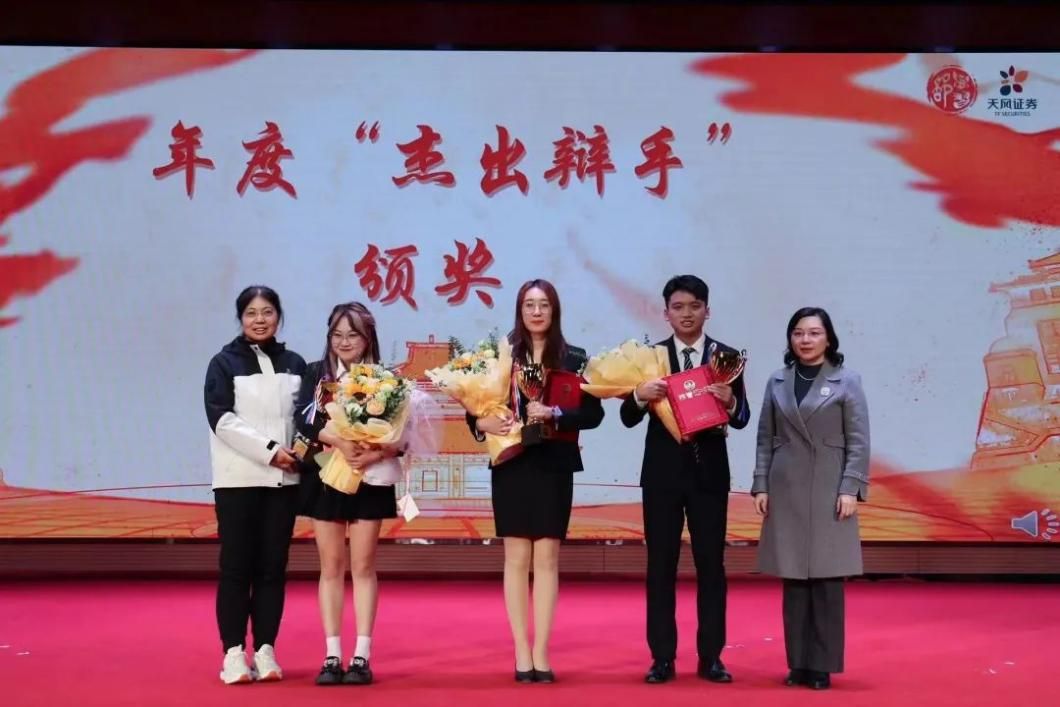This article was submitted as part of a campus-wide contest inviting students of Wuhan University to share highlights from their exchange experience and campus life.
On the evening of December 3, the final of the 35th Golden Autumn Debating Competition was held at the Humanities Science Hall in the Arts Education Centre. Distinguished guests from the Youth League Committee and faculty leaders from various academies attended the event.

Presenters during the competition’s opening session
Unfolding between the School of Marxism (Pro) and the School of History (Con), the debate centered around the compelling topic: Is the beauty of life found in moments or eternity? This query sparked an insightful and passionate debate between the two teams. In the argument-presenting session, the affirmative side contended that life’s beauty resides in ephemeral moments, emphasizing the dynamic interplay between subjective experiences and objective reality. They argued that beauty’s fleeting nature, intertwined with personal experiences and memories, is what makes it precious and meaningful.

The teams of the School of Marxism (left) and the School of History (right) during the debate
In contrast, the opposing team from the School of History argued for the enduring nature of beauty, positing that it lies in the concept of eternity. Drawing on the metaphor of Theseus’ ship, which is a paradox about identity conversion, they suggested that while life may be transient, its beauty can be a continuous journey, with each moment contributing to an everlasting legacy. They highlighted that the pursuit of enduring values, as seen in human achievements and advancements, underscores our inherent desire for permanence.
During the rebuttal and inquiry session, both teams skillfully navigated the philosophical nuances of their arguments. The affirmative side pointed out that both moments and eternity possess elements of beauty and imperfection. They underscored the richness and diversity of moments, arguing that beauty lies in the variability of experiences and emotions. In contrast, the opposing team maintained that eternity is the essence of beauty, with moments serving merely as vessels to carry this enduring beauty.
The free debate segment was particularly vibrant, with the affirmative team emphasizing the importance of embracing change and valuing the vividness of moments. They cited examples such as the pivotal moments in agronomist Yuan Longping’s career and the unique beauty experienced firsthand in Guilin’s landscapes. Conversely, the opposing team argued that the destruction of transience does not undermine beauty, asserting that the pursuit of eternity, as exemplified by Yuan’s research and Guilin’s enduring landscapes, is a pursuit of life’s true beauty.
In their closing statements, the opposition spoke to the potential of ordinary individuals to achieve greatness through contributions to eternity, highlighting humanity’s resilience against fleeting moments. The affirmative, however, championed the idea that life’s beauty lies in withstanding the test of eternity, encouraging people to cherish life’s serendipitous encounters and beautiful experiences.
After an intense competition, the School of Marxism debate team emerged victorious with a score of 4:3. The title of ‘Best Debater’ was awarded to Shang Yinuo from the opposing team. Additionally, three debaters, Wang Yue from the School of Journalism and Communication, Hu You from the School of National Internet Security, and Shang Yinuo were recognized as ‘Outstanding Debaters of the Year’, voted by representatives of other debate teams.

The awarding ceremony

‘Outstanding Debater of the Year’ Award Ceremony
Marking the conclusion of the Golden Autumn Art Festival, this event once more showcased the intellectual vitality and eloquence of Wuhan University’s students. It reflected the university’s commitment to fostering a dynamic academic environment and encouraging deep intellectual exploration among its students. The festival’s successful conclusion serves as a testament to Wuhan University’s enduring tradition of celebrating academic and cultural pursuits.
Photo by Students’ Union of Wuhan University
Edited by Wu Jing, Cao Hangqian


